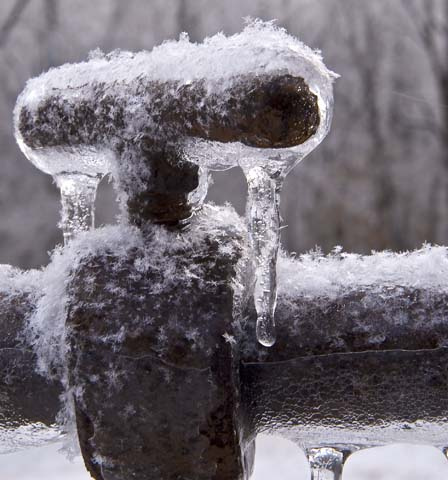The content down below involving How To Avoid Freezing Pipes is relatively entertaining. Read it for yourself and see what you think of it.

Cold weather can damage your pipes, specifically by freezing pipelines. Below's how to prevent it from happening and what to do if it does.
Introduction
As temperatures decrease, the danger of frozen pipes boosts, potentially resulting in expensive repair work and water damage. Understanding how to stop icy pipes is important for property owners in cold environments.
Avoidance Tips
Protecting vulnerable pipelines
Wrap pipes in insulation sleeves or make use of warm tape to protect them from freezing temperature levels. Focus on pipelines in unheated or outside areas of the home.
Home heating methods
Keep indoor rooms properly heated, especially locations with plumbing. Open up cupboard doors to permit warm air to flow around pipes under sinks.
Exactly how to recognize frozen pipelines
Seek decreased water flow from taps, uncommon odors or noises from pipes, and noticeable frost on exposed pipes.
Long-Term Solutions
Structural adjustments
Think about rerouting pipelines far from outside wall surfaces or unheated locations. Include extra insulation to attic rooms, basements, and crawl spaces.
Upgrading insulation
Invest in top notch insulation for pipelines, attics, and walls. Proper insulation helps maintain consistent temperature levels and lowers the threat of frozen pipes.
Protecting Exterior Pipes
Garden hoses and exterior taps
Disconnect and drain pipes yard hoses prior to wintertime. Install frost-proof faucets or cover outside taps with protected caps.
Understanding Icy Pipes
What triggers pipes to freeze?
Pipelines freeze when revealed to temperatures listed below 32 ° F (0 ° C) for extended periods. As water inside the pipes freezes, it increases, putting pressure on the pipeline wall surfaces and potentially triggering them to burst.
Risks and problems
Icy pipes can cause supply of water disruptions, property damage, and expensive fixings. Burst pipes can flood homes and trigger substantial architectural damages.
Indications of Frozen Piping
Recognizing icy pipelines early can avoid them from rupturing.
What to Do If Your Pipes Freeze
Immediate actions to take
If you suspect icy pipelines, maintain faucets open to relieve stress as the ice thaws. Utilize a hairdryer or towels soaked in warm water to thaw pipes slowly.
Verdict
Stopping frozen pipelines needs proactive actions and quick feedbacks. By comprehending the causes, indicators, and preventive measures, home owners can safeguard their pipes during winter.
Helpful Tips to Prevent Frozen Pipes this Winter
UNDERSTANDING THE BASICS: WHY PIPES FREEZE AND WHY IT’S A PROBLEM
Water freezing inside pipes is common during the winter months, but understanding why pipes freeze, and the potential problems it can cause is crucial in preventing such incidents. This section will delve into the basics of why pipes freeze and the associated problems that may arise.
THE SCIENCE BEHIND FROZEN PIPES
When water reaches freezing temperatures, it undergoes a physical transformation and solidifies into ice. This expansion of water as it freezes is the primary reason pipes can burst. As the water inside the pipe freezes, it expands, creating immense pressure on the walls. If the pressure becomes too great, the pipe can crack or rupture, leading to leaks and water damage.
FACTORS THAT CONTRIBUTE TO PIPE FREEZING
- Low Temperatures: Extremely cold weather, especially below freezing, increases the risk of pipes freezing.
- Uninsulated or Poorly Insulated Pipes: Pipes located in unheated areas, such as basements, crawl spaces, or attics, are more prone to freezing. Insufficient insulation or lack of insulation altogether exacerbates the problem.
- Exterior Wall Exposure: Pipes running along exterior walls are susceptible to freezing as they encounter colder temperatures outside.
- Lack of Heating or Temperature Regulation: Inadequate heating or inconsistent temperature control in your home can contribute to frozen pipes.
PROBLEMS CAUSED BY FROZEN PIPES
WHY CERTAIN PIPES ARE MORE PRONE TO FREEZING
- Pipe Bursting: As mentioned earlier, the expansion of water as it freezes can cause pipes to burst, resulting in significant water damage.
- Water Damage: When pipes burst, it can lead to flooding and water damage to your property, including walls, ceilings, flooring, and personal belongings.
- Structural Damage: Prolonged exposure to water from burst pipes can compromise the structural integrity of your home, leading to costly repairs.
- Mold and Mildew Growth: Excess moisture from water damage can create a favorable environment for mold and mildew growth, posing health risks to occupants.
- Disrupted Water Supply: Frozen pipes can also result in a complete or partial loss of water supply until the issue is resolved.
https://busybusy.com/blog/helpful-tips-to-prevent-frozen-pipes-this-winter/
- Location: Pipes located in unheated or poorly insulated areas, such as basements, crawl spaces, attics, or exterior walls, are at higher risk of freezing.
- Exterior Pipes: Outdoor pipes, such as those used for irrigation or exposed plumbing, are particularly vulnerable to freezing as they are directly exposed to the elements.
- Supply Lines: Pipes that carry water from the main water supply into your home, including the main water line, are critical to protect as freezing in these lines can affect your entire plumbing system.
- Underground Pipes: Pipes buried underground, such as those connected to sprinkler systems or outdoor faucets, can be susceptible to freezing if not properly insulated.

As an avid person who reads on How to prepare your home plumbing for winter weather, I think sharing that post was worthwhile. Enjoyed our article? Please quickly share it. Let other people discover it. I thank you for your readership.
Visit Url
Comments on “Critical Strategies for Preventing Frozen Plumbing in Cold Weather”